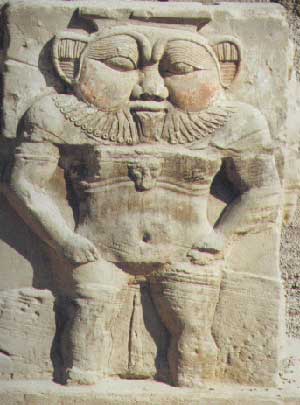Dwarves are respected in ancient Egypt
Ancient Egyptians respected dwarfs and did not consider them physically impaired.

Dwarf God Bes
A group of researchers at Georgetown University, USA, explored the biological traces and artistic evidence of dwarves in the ancient Egyptian world. They found the ancient Egyptians worshiping dwarves like gods and many of them held positions in the family.
In modern times, doctors have listed 100 medical conditions that cause short people. The main reason is due to the lack of cartilage development, the limbs shrink. This situation affects 25,000 births every year. About 75% of people are restricted to their average-sized parents.
American researchers have explored the ancient Egyptian world by the hot dry air and the perfect burial system that preserves intact human bones. They learn about dwarves who have luxurious social status and ordinary dwarves.
They found the earliest evidence of the dwarf from the Badarian period (4,500 BC) and several skeletons dating back to the Old Kingdom (2700 - 2190 BC). In addition there are many images of dwarves on the walls of the tomb, on jars, statues and other creatures.
Dwarves are described in at least 50 tombs, repetition of these pictures shows that they have a close relationship in society. The paintings show that dwarves participate as servants, supervisors, pet keepers, jewelers, dancers or entertainers. Some people hold high positions in the court and have enough power to be buried in the royal cemetery, close to the pyramid. In the ancient Egyptian world, there were also two dwarf gods, Bes and Ptah.
Bes is the sexual guard, women and children. His temple was recently unearthed in the Baharia oasis located between Egypt. Ptah is associated with rebirth and springtime.
Dr. Chahira Kozma said: " The burial area and art pictures provide a view of the dwarf's position in the daily life of ancient Egyptians. Dwarves are accepted in society, and the Their disorder is never considered a physical defect ".
- Discovered the grave of dentists in ancient Egypt
- Homosexuality in ancient Egypt
- Learn the disasters that destroyed ancient Egypt
- 6 things we do not know about the people of ancient Egypt
- 3 everyday items you won't believe are from ancient Egypt
- Mysterious mysteries of ancient Egypt
- The tragic life of dwarves locked up in the zoo in New York
- Discovered an ancient tomb over 3,500 years old in Egypt
- New timeline for the beginning of ancient Egypt
- Find ancient Pharaoh and god statues in Egypt
- Unexpected discovery of the
- The dangers you face if living in ancient Egypt
 Discovered an ancient centipede fossil 99 million years old
Discovered an ancient centipede fossil 99 million years old Discovered bat-like dinosaurs in China
Discovered bat-like dinosaurs in China Discovered a 200-year-old bronze cannon of the coast
Discovered a 200-year-old bronze cannon of the coast Discover 305 million-year-old spider fossils
Discover 305 million-year-old spider fossils